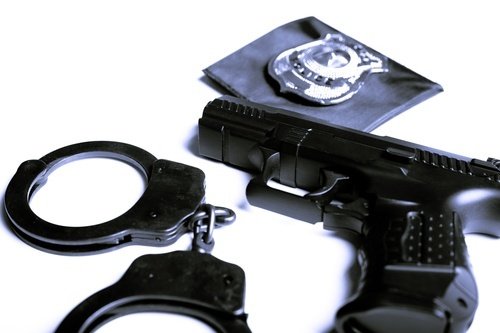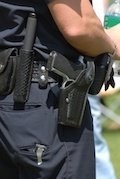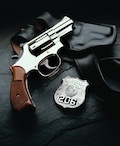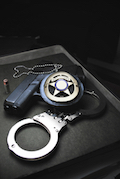Victims of a police shooting in Nevada may be able to sue law enforcement for battery and for violating their civil rights. Even though police carry firearms on their belt, shooting guns at people is a form of police misconduct in Nevada with rare exceptions, including:
- shooting in lawful self-defense, and/or
- shooting to stop a dangerous suspect from escaping
Depending on the case, plaintiffs who sue law enforcement for wrongfully shooting them may be awarded compensatory damages to cover their:
And if the plaintiff can show that the police behaved maliciously, the court can also award punitive damages.
In this article, our Las Vegas Nevada personal injury attorneys discuss:
- 1. When police may shoot at suspects
- 2. Suing police for unlawful shooting
- 3. Whom to sue for a police shooting
- 4. Getting money in a police shooting lawsuit
- 5. Statutes of limitations
- 6. Defenses to a police shooting

1. When police may shoot their firearms at suspects in Nevada
Two circumstances where law enforcement may lawfully shoot their guns at suspects in Nevada are:
- In self-defense or defense of others if the shooting is necessary and proportional to the threat
- To prevent a suspect from escaping if the officer has probable cause to believe the suspect is a dangerous threat to others
Note that Nevada police are also permitted to use deadly force if necessary to suppress a riot, capture an escaped felony, or effect an arrest. Learn more in our article on suing for deadly force by police in Nevada.
1.1. Self-defense or defense of others
Police have the same rights to defend themselves and others as civilians do. Fighting back in self-defense or defense of others is lawful when:
- The officer reasonably believes he/she (or another) is facing an urgent or pressing threat or bodily harm, and
- The officer uses no more physical force than necessary to deflect the threat

Officers know that bullet wounds are potentially fatal if not treated promptly. Therefore, the aggressor must be posing a very severe threat in order to justify an office shooting a gun, even if the officer is not shooting to kill.
In order for an officer to lawfully shoot in self-defense or defense of others, the shooting must be necessary to deflect the force, and it must be proportional to the threat that the aggressor posed. For example, merely spitting on a Las Vegas Metropolitan Police officer is not sufficient to justify the officer shooting in response. But pulling out a deadly object like a knife on a police officer may be sufficient justification for an officer to shoot in response.1
1.2. Preventing a dangerous suspect from escaping
Officers may fire their guns at escaping criminal suspects if the officer has probable cause to think that the suspect poses a threat. Therefore, officers should refrain from shooting non-dangerous suspects even if that means the suspect will get away.
For example, an officer probably would not be justified in shooting an escaping suspect who was unarmed and only stole a pack of gum. This is because a petty shoplifter is not in and of itself dangerous…
But an officer probably could legally shoot an escaping suspect who the officer believes just committed armed robbery. This is because the suspect is armed and potentially dangerous; and if the suspect allegedly committed robbery, he/she may be willing to commit another violent crime again. (If feasible, police are supposed to give a verbal warning to fleeing suspects before resorting to deadly force.)2
2. Suing police for unlawful shooting at suspects in Nevada

Victims of an unjustified police shooting may be able to bring two types of lawsuits against law enforcement:
- Nevada tort claims
- Section 1983 lawsuits in Nevada
2.1. Civil tort claims
A tort is just the legal term for a wrong that one person inflicts on another. Unlike crimes, which are prosecuted by the state against the alleged perpetrator, torts are prosecuted by the victim against the alleged perpetrator.
Common torts that police may be sued for if they shoot their guns unlawfully include:
- Battery, if the shooting physically wounded the victim
- Wrongful death, if the shooting killed the victim (the victim’s family would bring a wrongful death case)
- Intentional infliction of emotional distress, if the police’s conduct was extreme or outrageous
Police who lose tort lawsuits may be ordered to pay money damages to the victim. Unlike crimes, torts do not carry jail or prison time. This is because torts are civil — not criminal — actions.
2.2. Section 1983 lawsuits

Section 1983 of the United States Code title 42 provides police shooting victims another avenue of legal redress. The two elements of a Section 1983 claim that a plaintiff needs to prove are:
- The victim had a civil right violated, and
- The violation was done by someone acting under the color of law
Arguably, police who shoot a person without legal justification violate the victim’s Fourth Amendment rights against unreasonable search and seizure. Therefore, police shooting victims may be able to bring a Section 1983 lawsuit against the offending police officers for violating their constitutional rights.3
Note that Section 1983 claims apply only to police officers who are city, county, or state employees. If the officer is a federal employee such as a U.S. marshal, then the shooting victim could bring a “Bivens” lawsuit, which is essentially a federal version of a Section 1983 lawsuit.4
3. Defendants in a police shooting case in Nevada
Depending on the case, victims of a police shooting may be able to sue the following parties:
- the police officer(s) or sheriff’s deputy who shot the victim,
- the police chief or sheriff,
- the police department or sheriff’s office, and/or
- the city or county
The police officer who did the shooting might not have much money; therefore, a civil rights attorney would explore also suing entities that have deeper pockets, such as the police department and/or municipality that employed the officer.
4. Getting money in a police shooting lawsuit in Nevada
Police shooting victims who win their personal injury and/or Section 1983 lawsuits can be awarded compensatory damages. Compensatory damages are meant to make the victim “whole” by covering their expenses associated with their injuries:

- hospital and other medical bills,
- pain and suffering,
- lost wages, and/or
- loss of future earnings
If the court finds that the police officer acted maliciously, then the court can order punitive damages as well. Depending on the case, punitive damages can be three times or more the amount of the compensatory damages.
In Section 1983 lawsuits, the plaintiff may also be able to recover their attorneys’ fees.5
5. Statute of limitations for police shooting lawsuits in Nevada
Victims of a police shooting have two (2) years after the injury to bring a personal injury or Section 1983 lawsuit. But if the victim is facing criminal charges, then it may be possible to “toll” the waiting period to bring a Section 1983 lawsuit until after the criminal case gets resolved.6
Police shooting victims should always consult with a Nevada criminal defense attorney to help calculate how long they have to sue for their injuries.
6. Defenses to police shooting lawsuits in Nevada
Two typical defenses police may raise when defending against shooting lawsuits are:
- the police acted reasonably, and/or
- the defendants have qualified immunity from prosecution
6.1. The police acted reasonably
Police officers may escape liability for shooting a person if they can show that their actions were objectively reasonable under the circumstances. Situations that might justify a police shooting include:
- It appeared the shooting victim was about to kill or seriously injure the police officer (“self-defense”)
- It appeared the shooting victim was about to kill or seriously injure someone else (“defense of others”); and/or
- the police officer witnessed the victim committing a crime, and the victim was armed and running away

So even if the shooting victim never truly posed a threat, it is still possible for the officer to win the lawsuit if he/she can show that any reasonable person in his/her situation would have acted similarly. For example, if the shooting victim was wielding a toy gun that appeared to be real, a court may exonerate the police officer for shooting if a reasonable person in the officer’s position would have thought the gun was real too.7
6.2. Qualified immunity
Police officers in Section 1983 lawsuits can often claim “qualified immunity.” This is the legal presumption that they executed their discretionary job duties in good faith.
The shooting victim’s attorney would then try to “rebut” this presumption by introducing evidence that the police officer did not act in good faith. Evidence such as video surveillance and eyewitnesses would be valuable in demonstrating the officer’s actions and state of mind.8

Is your case in California? Learn more in our article about police misconduct lawsuits in California.
Is your case in Colorado? Learn more in our article about police misconduct lawsuits in Colorado.
Legal References:
- NRS 200.275; NRS 193.240; NRS 193.250; NRS 200.200; NRS 200.120.
- NRS 200.140; NRS 171.1455.
- Graham v. Connor, 490 U.S. 386 (1989)(“All claims that law enforcement officials have used excessive force — deadly or not — in the course of an arrest, investigatory stop, or other “seizure” of a free citizen are properly analyzed under the Fourth Amendment’s “objective reasonableness” standard, rather than under a substantive due process standard.“); Tennessee v. Garner, 471 U.S. 1 (1985)(“[T]here can be no question that apprehension by the use of deadly force is a seizure subject to the reasonableness requirement of the Fourth Amendment.”).
- Bivens v. Six Unknown Named Agents, 403 U.S. 388 (1971).
- 42 U.S.C. § 1988.
- NRS 11.190; Day v. Zubel, 112 Nev. 972 (1996).
- See Graham v. Connor, 490 U.S. 386 (1989).
- Butler v. Bayer, 123 Nev. 450 (2007).

